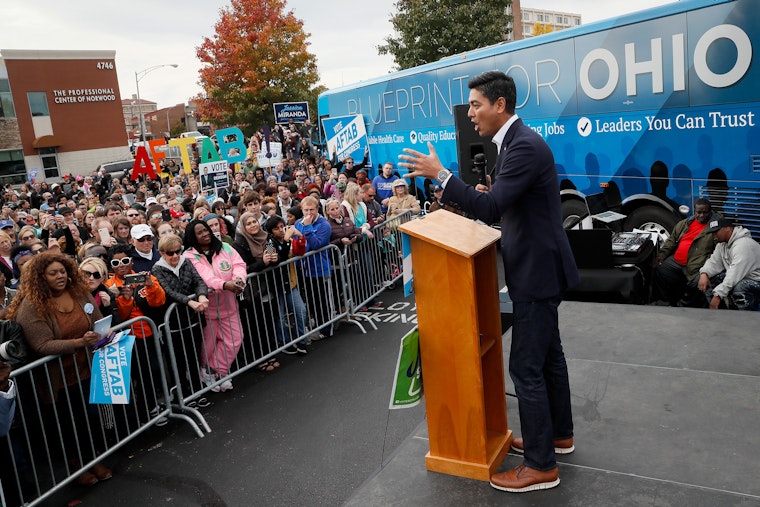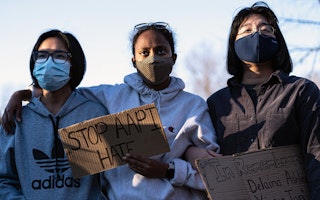Post-Election Punditry Overlooks Asian American Gains
By Laleh Ispahani

Off-year elections typically produce rough nights for the party in power and last week’s vote was no exception. Democrats lost every statewide race in Virginia and narrowly held the governorship in New Jersey—both blue states. Pundits are parsing familiar themes of Democrats in disarray and the GOP’s ability to once again inflame the culture wars to their political advantage.
This negative narrative, though, obscures some important victories worthy of their own headlines, as they suggest landmarks on the longer march toward a truly multiracial democracy.
In Boston, Democrat Michelle Wu became the first Asian American ever elected mayor of Boston. The runner-up was fellow Democrat Annissa Essaibi George, who is Arab American. Wu will succeed the city’s acting mayor, Kim Janey, who became the first Black woman to hold the job after Mayor Marty Walsh joined the Biden administration as Secretary of Labor. This transition marks a sea change in a city not exactly famous for its racial inclusion, having been run for the better part of a century by white men.
In Cincinnati, Aftab Pureval defeated David Mann, a longtime local political leader. Pureval, whose family immigrated from India, becomes the first Asian American to lead his city. In Dearborn, Michigan, state Rep. Abdullah Hammoud became the first Arab American and first Muslim to lead the city of 109,000, which has long been home to a sizable Arab population. He bested another political veteran, Gary Waronchak, a former state Representative and former Wayne County Commissioner.
And in Seattle, Bruce Harrell, a former city council president and second-generation Japanese American, became the city’s first Asian American mayor.
But those weren’t the only firsts for multiracial democracy on November 2. Change was on the ballot from Manhattan to Middle America. New York City elected five new city council members from the Asian American and Pacific Islander community, including its first Muslim (in a city of 800,000 Muslims), its first South Asian Americans, and its first Korean Americans. And Duluth, Minnesota elected its first Muslim to city office: Azrin Awal, a 25-year-old immigrant from Bangladesh.
These advances are all the more stunning given the wave of hate targeting Asian Americans during the pandemic. According to the latest FBI figures, hate crimes against Asian Americans increased by more than 73 percent in 2020. That number is all the more stark given a documented reluctance among Asian Americans historically to report incidents of hate to authorities.
It is also important to note that several of these electoral victories came in cities without large Asian American populations. Indeed, the AAPI community makes up a relatively small percentage of all voters in places like Boston and Cincinnati. The fact that significant numbers of white voters supported these candidates is a storyline surely as worthy of media attention as the fixation on white suburban swing voters who went Republican on Tuesday.
Pureval summed up the change nicely. When he was first starting out in politics, “[everybody] would tell me: ‘there’s no way a brown guy is going to win a county-wide seat in Cincinnati.’ Now, people tell me, ‘I can’t run and win because my name is Joe Smith.’ So there’s a tipping point by which our community’s perceived weakness turns into a real strength.”
What is equally heartening is how many Americans turned out to vote, despite the historic tendency for turnout in off-year and midterm elections to drop significantly from presidential election year levels. Virginia’s vote was held following implementation of historic voting reforms, including no-excuse voting, expansion of in-person voting, and removal of a photo voter ID requirement. Parts of the state saw the highest levels of turnout in recent history. Georgia and Iowa also saw substantial turnouts.
This level of civic engagement is encouraging—especially coming on the heels of Donald Trump’s endless sore-loser rants about the legitimacy of the 2020 presidential election, and a massive effort to approve voter suppression measures in Republican-controlled state legislatures across the country. As the results in Virginia suggest, improving access to the ballot box, and removing impediments that make voting harder, can clearly benefit both parties—and all Americans. It’s time for Congress to pass federal protections of voting rights, to ensure free, fair, and secure elections across the country in 2022 and beyond. The future of America’s multiracial democracy looks bright, if only the people have a chance to exercise their constitutional right to choose their leaders.

Laleh Ispahani is managing director of Programs at the Open Society Foundations.


